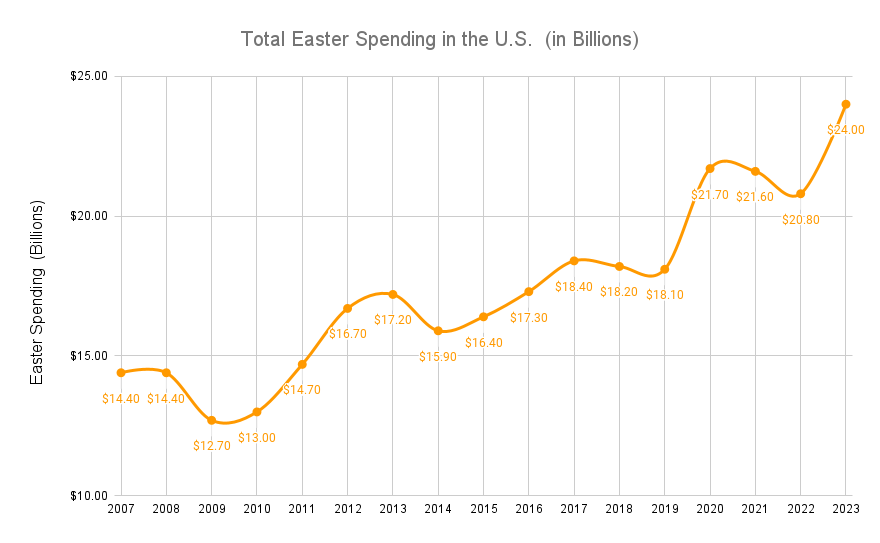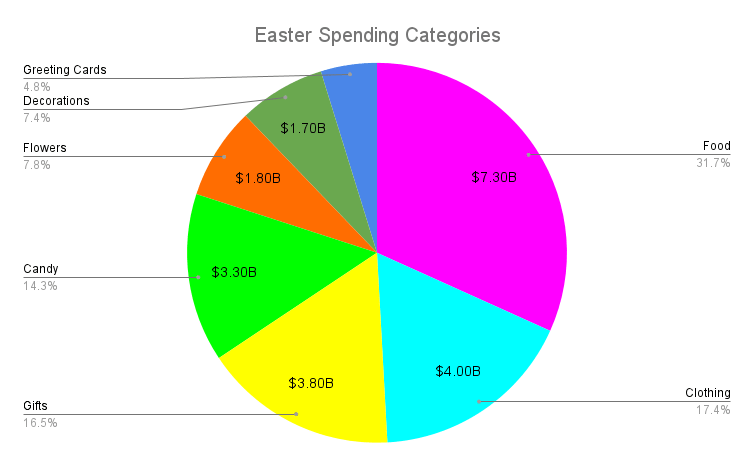81% of Americans plan to celebrate Easter in 2023, and total U.S. spending on Easter-related products is expected to be $24 billion. That’s more than double what Americans spent on Halloween in 2022 ($10.6 billion) and just shy of what Americans spent on Valentine’s Day in 2023 ($25.9 billion).
Annual Easter Survey by Prosper Insight & Analytics and the National Retail Federation

Where does all this money go?
The biggest chunk goes towards classic Easter foods such as eggs, ham, baked mac & cheese, and corn casserole. However, billions of dollars also go towards more Easter-specific products such as chocolate bunnies, plastic eggs, and Easter Lilly flowers. A breakdown of Eastern spending by category is shown in the pie chart below.

Diving even further into the details, some of the specific products which sell significant volume on Easter weekend are:
- Peeps (a type of disgusting-but-somehow-extremely-popular marshmallow bird candy manufactured by a family-owned Pennsylvania company, Just Born, Inc.)
- Chocolate bunnies. Lindt is probably the largest manufacturer of chocolate bunnies, but Hershey’s and just about every other candy company also makes them.
- Chocolate eggs. From M&Ms to See’s Candies owned by Berkshire Hathaway, again, just about every candy company makes a version of chocolate eggs for Easter. Cadbury eggs may be the most famous.
- Plastic eggs. Ironically, one of the biggest manufacturers of these Christian holiday products is a Jewish business: The Dreidel Company. However, many other companies also make plastic eggs. For example, Boston-based Snow Goose Games LLC sells plastic eggs under the PrexTex brand. Target also markets plastic eggs under their “SPR!TZ” brand, and toy startup Joyin makes plastic eggs under their own name.
- Egg Coloring Kits. Many companies sell their own branded versions of these.
- Flowers. Easter Lillies, Daffodils, Easter Cactus flowers, and Tulips are the most commonly sold flowers on Easter weekend.
- Eggs. Around 180 million eggs are purchased for Easter each year.
- Baskets. Various types of plastic and wicker baskets (both empty and filled) are purchased and used by many people who celebrate Easter. Roughly one third of American adults are planning an Easter egg hunt so I would imagine at least 20% of Americans use Easter baskets.
- Fake Easter Grass. It’s basically tinsel but for Easter instead of Christmas.
Easter Activity Statistics
The most popular activities on Easter Sunday are:
- Cooking a holiday meal (56% of Americans)
- Visiting family and friends (50%)
- Going to church (43%)
- Planning an Easter egg hunt (34%)
Before Easter Sunday, many families also purchase Easter dresses, suits, and other spiffy clothes for their kids. These “Easter clothes” were traditionally worn to church.
Easter Business Ideas
- Online store for pre-packed but customizable Easter baskets with fast shipping. I would target parents aged 35-44 with kids aged 5-8.
- Comedic chocolate bunnies. I would market these with short-form viral videos on TikTok and Instagram Reels.
- Easter egg hunt as a service. Upper class families would hire you to bring Easter eggs and baskets to large family Easter events and hide them throughout their house and/or yard for their kids to hunt for.
Appendix A: Game Companies Monetize Easter
Pet Simulator X (which is basically Roblox’s version of Pokemon) has capitalized on Easter by including both Easter eggs and even an Easter Bunny in the game. The Easter Bunny is a highly valuable pet in the game which many gamers become obsessed with catching during Easter season.
Appendix B: How much do Easter Egger Chickens Cost?
An Easter Egger chicken is any mixed-breed chicken which carries both the brown-egg-laying gene and the blue-egg-laying gene. These birds can lay blue, brown, or pink eggs. You can purchase a baby Easter Egger chick for less than $5.